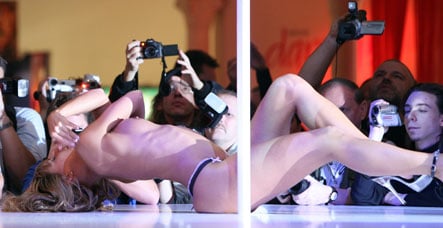Germans are famous for their relaxed attitudes toward nudity and sexuality, but they also have two lesser-known passions: healthy organic products and trade fairs.
“Bio” – as Germans label naturally organic items – seems to get slapped on everything these days from beer to blue jeans. The Teutonic fascination with trade fairs is harder to explain, however, if you look long enough you’ll find even the most obscure pastime or industry has a mass gathering of some sort in Germany.
So it should probably be little surprise the German sex industry has its own get-together – Berlin’s annual Venus tradeshow – and that this year there was a noticeable increase in organic erotic products on offer.
Click here for a photo gallery of the Venus.
On a blustery October weekend in Berlin plenty of average folks streamed towards what has become the largest sex trade fair in the world. Nearly 400 exhibitors from 36 different countries came to pimp their skin flicks and hawk their fetish gear.
Sex goddesses in high heels and fishnet stockings prowled the exhibition hall, as men from all walks of life snapped pictures and held video cameras glued to their faces.
But alongside the horny masses and sprinkling of porn starlets, there were serious vendors hoping to combine the growing demand for organic products with various erotic items that have long since become mainstream.
“We believe that sex is good for your health,” said Peter Ackerfeldt, Marketing Manager for the Swedish firm Viamax.
His company, founded in 2001, produces a range of aphrodisiacs made from naturally grown herbs. It’s just one of several businesses at this year’s Venus that have cornered the “nature-based” segment of the erotic market – one with particularly high mainstream potential.
“We take the step from porn to health. Most of our products have been used since ancient times to promote sexual health, and we combine that knowledge with modern processing technology in order to get the best effect out of them,” said Ackerfeldt.
He explained that he thinks perceptions are changing, not just about the value of organic products in society, but also about the role of sex.
“It’s a new era, new companies, new people coming to the business and a wider acceptance among mainstream people,” he said. “We see that specifically in Sweden where we sell sex toys in the pharmacies nowadays, which was something unheard of a couple of years ago.”
Rebecca Powley from Intimate Organics, a firm based in Tallahassee, Florida, agreed that the time for all-natural erotic products had come.
Her company’s mind-boggling assortment of lotions and gels are all produced according to strict natural standards.
“Everything is made with certified organic extracts,” she said. “They’re glycerin free, DEA free, they’re pure vegan, paraffin free. So they’re pretty much as healthy as you can get in terms of using something healthy on your body.”
She also said Venus was by far the most expansive sex industry trade fair she’d ever attended: “I do maybe six other shows during the year – Los Angeles, Las Vegas, what have you, and it’s just so on a whole other level.”
The growing number of visitors coming to Venus each year would appear to be a sure sign of its mainstream success. “This is my first time at a fair like this,” said a woman named Sally. “It’s definitely very explicit, but on the other hand … I think (it’s good) when people live more open, honest lives, or when fantasies can be played out.”
Of course, not everyone was at the Venus looking for certified vegan edible panties. Two young male visitors, who only identified themselves as Prex and Tire, said they came for the live sex shows. But they saw nothing odd combining hedonistic pleasures with the commercial aspect of the event.
“There are people in every part of the world taking off their clothes,” said Prex. “So, why not have a trade fair?”



 Please whitelist us to continue reading.
Please whitelist us to continue reading.